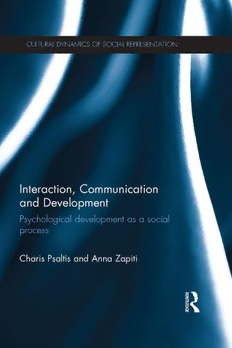
Interaction, Communication and Development: Psychological Development as a Social Process PDF
Preview Interaction, Communication and Development: Psychological Development as a Social Process
Interaction, Communication and Development For decades there has been considerable interest in the ways that interactions betweenchildrenprovideabeneficialcontextforthestudyofcognitiveandsocial development.In this book, Psaltis and Zapiti use both theoretical and empirical research to build on the perspectives of Piaget, Vygotsky, Moscovici and oth- ers, includingthe legacyofGerardDuveen,toofferastate-of-the-artaccountof researchonthethemesofsocialinteractionandcognitivedevelopment. Interaction, Communication and Development discusses the significance of social identities for social interaction and cognitive development. The empiri- cal set of studies presented and discussed focus on patterns of communication between childrenas they work togetherto solve problems. Communicationsare examinedindetailwithafocuson: • socio-cognitiveconflict,conversationalmovesandconversationtypes; • the way the different forms of interactions relate to different sources of asymmetryintheclassroom; • thewaysocialrepresentationsandsocialidentitiesofgenderarenegotiatedin theinteraction. Thisbookprovidesanimportantaccountofhowchildrendevelopthroughdiffer- ent kinds of social interactions. It will have considerable appeal for researchers in thefieldsofdevelopmentalpsychology,socio-culturalpsychology,socialrep- resentations theory and education who wish to gain a deeper understanding of developmentanditsrelationtosocio-culturalprocesses. CharisPsaltisisAssistantProfessorofSocialandDevelopmentalPsychologyat theUniversityofCyprus. AnnaZapitiisaResearchAssociateoftheGeneticSocialPsychologyLaboratory oftheUniversityofCyprusandaprimaryschoolteacher. TheseriesCulturalDynamicsofSocialRepresentationisdedicatedtobringing the scholarly reader new ways of representing human lives in the contempo- rary social sciences. It is a part of a new direction – cultural psychology – that has emergedat the intersectionof developmental,dynamicand socialpsycholo- gies, anthropology, education, and sociology. It aims to provide cutting-edge examinations of global social processes, which for every country are becoming increasinglymulti-cultural;the world is becomingone ‘globalvillage’,with the correspondingneedtoknowhowdifferentpartsofthat‘village’function.There- fore,socialsciencesneednew waysof consideringhowto study humanlivesin their globalisingcontexts.The focusof thisseries is the socialrepresentationof people,communities,and–lastbutnotleast–thesocialsciencesthemselves. In this series Symbolic Transformation: The Mind in Movement Through Culture and Society Edited by Brady Wagoner Trust and Conflict: Representation, Culture and Dialogue Edited by Ivana Marková and Alex Gillespie Social Representations in the ‘Social Arena’ Edited by Annamaria Silvana de Rosa Qualitative Mathematics for the Social Sciences: Mathematical Models for Research on Cultural Dynamics Edited by Lee Rudolph Development as a Social Process: Contributions of Gerard Duveen Edited by Serge Moscovici, Sandra Jovchelovitch and Brady Wagoner Cultural Realities of Being: Abstract Ideas within Everyday Lives Edited by Nandita Chaudhary, S. Anandalakshmy and Jaan Valsiner Interaction, Communication and Development: Psychological Development as a Social Process Charis Psaltis and Anna Zapiti Engaging Violence: Trauma, Memory and Representation Edited by Ivana Macˇek Interaction, Communication and Development Psychological development as a social process Charis Psaltis and Anna Zapiti Firstpublished 2014 byRoutledge 27ChurchRoad,Hove,EastSussex, BN32FA andbyRoutledge 711ThirdAvenue,NewYork,NY10017 RoutledgeisanimprintoftheTaylor&FrancisGroup,aninformabusiness (cid:2)c 2014Charis Psaltisand AnnaZapiti TherightofCharis PsaltisandAnnaZapititobeidentified asauthors ofthisworkhasbeenasserted bytheminaccordance withsections77and78oftheCopyright, DesignsandPatents Act1988. Allrights reserved. Nopartofthisbookmaybereprinted or reproduced orutilisedinanyformorbyanyelectronic,mechanical, orothermeans, nowknownorhereafterinvented, including photocopying and recording, orinanyinformation storage or retrieval system,withoutpermissioninwritingfromthepublishers. Trademarknotice: Productorcorporate names maybetrademarks orregistered trademarks, and areusedonlyforidentification and explanation withoutintenttoinfringe. BritishLibrary Cataloguing inPublication Data AcataloguerecordforthisbookisavailablefromtheBritishLibrary LibraryofCongressCataloging inPublication Data Psaltis,Charis Interaction, communication anddevelopment :psychological developmentasasocialprocess/Charis Psaltisand AnnaZapiti. pages cm 1.Social interaction inchildren.2.Communication– Psychological aspects.3.Learning, Psychologyof. 4.Constructivism (Education) 5.Childdevelopment. 6.Childpsychology. 7.Educational psychology. I.Zapiti,Anna. II.Title. BF723.S62P73 2014 155.4’182–dc23 2013038680 ISBN:978-0-415-64387-0(hbk) ISBN:978-0-203-07984-3(ebk) TypesetinTimes bySunrise Setting Ltd,Paignton, UK In memory of Gerard Duveen This page intentionally left blank Contents Listoffigures xi Listoftables xii Serieseditor’sforeword xiii Preface xviii 1 A genetic perspective on interaction and development 1 PiagetandVygotskyintheeverydayeducationalpraxis 1 GeneticsocialpsychologyandtheworkofGerardDuveen 3 Towardsthestudyofthesocialpsychologicalsubject 5 Geneticsocialpsychologyandtheepistemologyof socialrepresentations 7 Implicationsofgeneticsocialpsychologyforeducation 9 Outlineofthebook 13 References 15 2 Varieties of the social 20 ThesocialinPiaget 21 EgocentrisminPiagetiantheory:thenotionandits sociologicalunderpinnings 22 DurkheimandLévy-BruhlasancestorsofPiaget 24 PiagetandLévy-Bruhlonthegenesisofknowledge 27 Piagetinhissocio-culturalcontext:cooperationandits importanceforeducation 30 ThestrengthandweaknessofthePiagetian conceptionofthesocial 31 Vygotskyandthesocial 34 Vygotskyandhisrelationshiptoreligion,traditionandheritage 35 VygotskyandtheMinistryofEducation 36 ProblemswiththeZoneofProximalDevelopment 41 viii Contents PiagetandVygotsky:asynthesis? 43 References 47 3 The development of representations through communication 53 Moscovici:fromcollectivetosocialrepresentationsandthe roleofPiaget 53 Moscoviciandsocialrepresentations:takingthereverserouteof PiagetandVygotsky 55 Cross-culturalcomparisonsonPiagetiantasks 56 Moscoviciandsocialinfluence 59 Moscovici’striadicmodelasaninspiration forthesocialGenevans 62 Afirstgenerationofresearchonsocialinteractionandcognitive developmentorwhenthesocialpsychologicalmetthe epistemicsubject 63 Socio-cognitiveconflictanditsimportance 65 Critiqueofsocio-cognitiveconflict 69 AsecondgenerationofresearchinGeneva 69 AthirdgenerationofresearchinGeneva 70 ThesecondgenerationofresearchinNeuchâtel 71 AthirdgenerationofresearchinNeuchâtel 73 References 76 4 Conversation types and interaction types: microgenesis of knowledge 84 Thethirdgenerationofresearchindetail 87 Theoutcomemeasures 90 Conversationalfeatures 90 Theresults 92 Non-conservinginteraction 95 Noresistanceinteraction 96 Resistanceinteraction 97 Explicitrecognitioninteraction 98 Fromonetasktoanother:the‘Villagetask’ 100 Theoutcomemeasures 105 Whatishappeningintheinteraction? 107 Theroleofacademicreputation,popularityand teacher’sevaluation 109 Conclusion 110 References 111 Contents ix 5 From one interaction to another: from microgenesis to ontogenesis 114 Conversationalfeatures 118 Theresults 120 Theinteractions 122 Firstinteraction 122 Secondinteraction 123 Discussion 123 References 127 6 Peer interaction and cognitive development: the role of gender at 6–7 and 10–11 years old 130 Towardsthestudyofthesocialpsychologicalsubject 133 Resultsfortheyoungerchildren 135 Resultsfortheolderchildren 138 Discussionfortheyoungerchildrengroup 139 Discussionfortheolderchildrengroup 142 Discussiononcomparisonsacrossage 144 Conclusion 144 References 146 7 Conclusions: towards a genetic social psychology 148 Thephenomenarevealedthroughempiricalevidence 148 Thesocialpsychologicalsubject 153 Theolderchildren 156 Implicationsforeducation 157 Othersourcesofasymmetryintheclassroom 160 Towardsageneticsocialpsychology:Piaget, Vygotskyandbeyond 163 Operativityincontext 166 Beyondmicrogenesisandontogenesis: sociogeneticchange 167 Implicationsfortheepistemologyofsocial representations 170 Concludingremarks 174 References 175 8 Appendices 181 Appendix1:TheConservationofLiquidstask 181 Appendix2:ThecodingframefortheConservation ofLiquidstask 182 Appendix3:TheVillagetask 184
